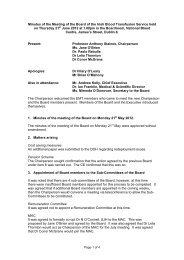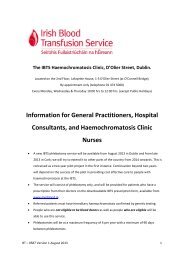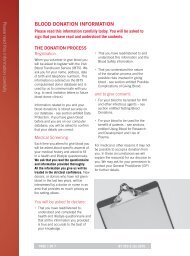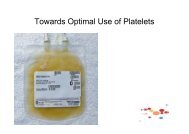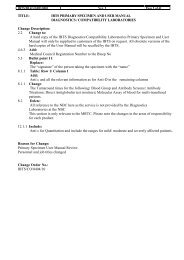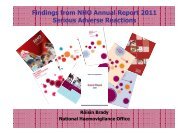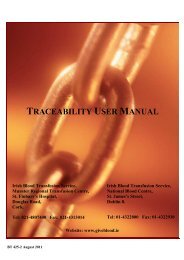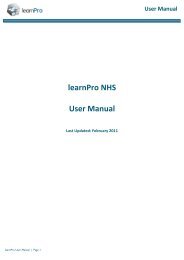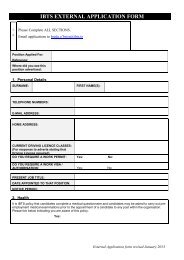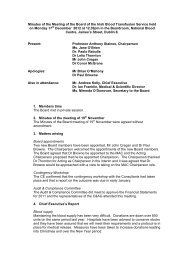IBTS Strategic Plan 2010 - 2012.pdf - Irish Blood Transfusion Service
IBTS Strategic Plan 2010 - 2012.pdf - Irish Blood Transfusion Service
IBTS Strategic Plan 2010 - 2012.pdf - Irish Blood Transfusion Service
You also want an ePaper? Increase the reach of your titles
YUMPU automatically turns print PDFs into web optimized ePapers that Google loves.
<strong>Strategic</strong> <strong>Plan</strong> <strong>2010</strong> - 2012 19<br />
:02<br />
Maintain International<br />
Best Practice<br />
Keeping <strong>Blood</strong> Safe<br />
We are aware for the most part of the major advances<br />
and emerging threats that could impact the blood supply<br />
over the next 3 years. This includes patterns of infection<br />
– especially Influenza, Chikungunya virus, Dengue, West<br />
Nile virus, and vCJD, as well as HIV, Syphilis, Hepatitis<br />
C&B, and developing technology such as molecular<br />
blood typing, NAT testing, and pathogen reduction.<br />
The <strong>IBTS</strong> must develop a series of effective strategies to<br />
deal with these emerging threats.<br />
National Haemovigilance Office<br />
The National Haemovigilance Office will continue<br />
to play a central role in monitoring, receiving and<br />
recommending corrective actions arising from reported<br />
serious adverse events and serious adverse reactions.<br />
Key Deliverables<br />
• Vigilance on developments in vCJD –<br />
particular reference to any decision by the<br />
UK to implement prion filtration<br />
• Participation on relevant committees in the<br />
UK dealing with blood safety and where<br />
appropriate other International Committees<br />
• Horizon scanning to give early warning of<br />
new threats so that effective strategies can<br />
be delivered in a timely manner<br />
• Constant review and evaluation of risk and<br />
adopting preventative actions<br />
• If the decision is taken to implement prion<br />
filtration on any scale, then this will require<br />
separate funding from the Government.<br />
Demonstrating the achievement of high<br />
standards and assure public confidence in the<br />
blood supply. <strong>IBTS</strong> will ensure that regulatory<br />
accreditation and compliance requirements are<br />
maintained at all times.<br />
Key Deliverables<br />
• Develop a set of measurements that<br />
demonstrate that the QMS is delivering<br />
continuous improvement<br />
• Carry out a full review of the structure of<br />
Quality Function to ensure it is organised in<br />
the most effective and efficient manner<br />
• Implement appropriate succession planning<br />
<strong>2010</strong> – 2012 to ensure that the knowledge<br />
base is protected and enhanced<br />
The <strong>IBTS</strong> delivers a reference serological<br />
service in the immunohaematology laboratory<br />
and this laboratory must achieve ISO 15189<br />
accreditation.<br />
Key Deliverables<br />
• Submit application for licence in <strong>2010</strong> for<br />
Diagnostics Laboratory in Dublin<br />
• Once licence granted to Dublin submit<br />
application for licence for Diagnostic<br />
Laboratory in Cork<br />
• In tandem prepare other testing<br />
laboratories for application for this<br />
standard. Have licence approval for testing<br />
laboratories by end 2012<br />
The National Tissue Typing Laboratory<br />
retaining EFI accreditation.



